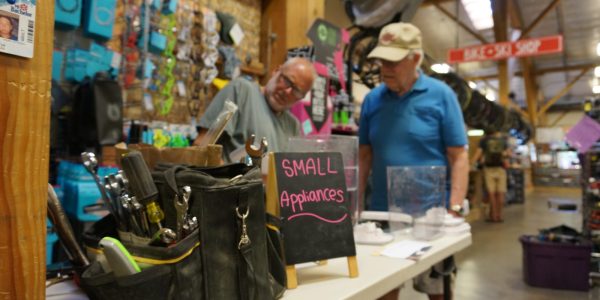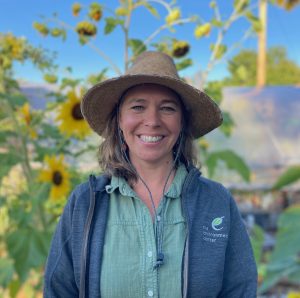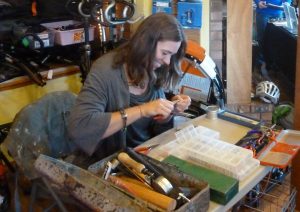We’re Celebrating 10 Years of Repair Café!

In 2013, we hosted the first Repair Cafés here in Central Oregon.
Over the past 10 years, The Environmental Center’s Rethink Waste Project hosted 24 Repair Cafés where community members brought in a total of 955 items. Our amazing crew of volunteer fixers repaired a total of 629 items and gave DIY instructions for another 141 items. This means 81% of items brought to Repair Cafés were kept out of the landfill.
 Meet Denise: Denise joined The Environmental Center in 2006 and is responsible for our on-site Kansas Avenue Learning Garden and the Garden for Every School program. She has a B.A. in Outdoor Education from Prescott College, and has over 20 years of experience with youth in classroom, outdoor and therapeutic settings. She had zero gardening experience before our garden broke ground in 2010, and has been learning new things every year ever since. She previously managed our Rethink Waste Project from 2011-2018, and continues to have a deep interest in being resourceful over buying new. When she’s not busy being a mom, she’s skiing, floating a river, or creating jewelry and art from upcycled materials at Lost and Found Art (check her out on Etsy!).
Meet Denise: Denise joined The Environmental Center in 2006 and is responsible for our on-site Kansas Avenue Learning Garden and the Garden for Every School program. She has a B.A. in Outdoor Education from Prescott College, and has over 20 years of experience with youth in classroom, outdoor and therapeutic settings. She had zero gardening experience before our garden broke ground in 2010, and has been learning new things every year ever since. She previously managed our Rethink Waste Project from 2011-2018, and continues to have a deep interest in being resourceful over buying new. When she’s not busy being a mom, she’s skiing, floating a river, or creating jewelry and art from upcycled materials at Lost and Found Art (check her out on Etsy!).
What sparked your interest in fixing?
I never considered myself a fixer, but I’m definitely resourceful and love altering somethings intended use to fit another need. The idea behind starting the first Repair Cafés actually came from the community. Someone reached out and left some resources about Repair Café International on my desk one day. A few months later, Portland had it’s first Repair Café, and my neighbor (and artist, upcycled sewer, sock darner extraordinaire) Lloyd McMullen left me a copy of the Oregonian that featured that first event. It had been gaining traction and interest in the world of materials management, so I reached out to friends and started planning the first event!
What was the first Repair Café in Central Oregon like?
From the archives: check out this news story and interview with Bend Bulletin from 2013!
What advice do you have for folks that want to repair something, but might not be sure how or where to start?
Through this work, I discovered ifixit.org. They have open-source repair manuals that members create and share, covering everything from phones to appliances. They even deconstruct new phones when they come out to report on its potential repairability. Worn wear has created some great instructional videos around repairing clothes and gear. My husband is the sewer gear fixer I give my stuff to, but I encourage anyone interested in repairing something to just look it up online. Chances are, someone out there has done it and wants to show you, too. If it’s already broken, you have nothing to lose!
What was the most memorable repair during your time hosting Repair Cafés?
One time, a woman gave me a bracelet to repair (I used to do some of the simple jewelry repair). She had been carrying it around in her purse for years as it had a lot of sentimental value to her. All it needed was a simple jump ring, but to someone who doesn’t make jewelry and have the supplies it was unusable. She was really grateful we could bring that back to life for her. Another time, someone brought in their parents’ toaster that they had received as a wedding gift, like 50 years prior. That’s when I learned to keep my eye out for vintage Sunbeam toasters. They are repairable, unlike the new ones that are essentially made to wear out and be replaced, instead of repaired.

From the archives: Denise hosts and fixes at Repair Café at the Gear Fix in 2015.
What’s your favorite sustainable practice at home?
We avoid disposables as much as possible by using reusables (and reuse the disposables we can’t avoid, like bread bags and salsa containers). From diapers years ago to napkins and rags now, we have a good system for washing these things and avoiding disposable items.